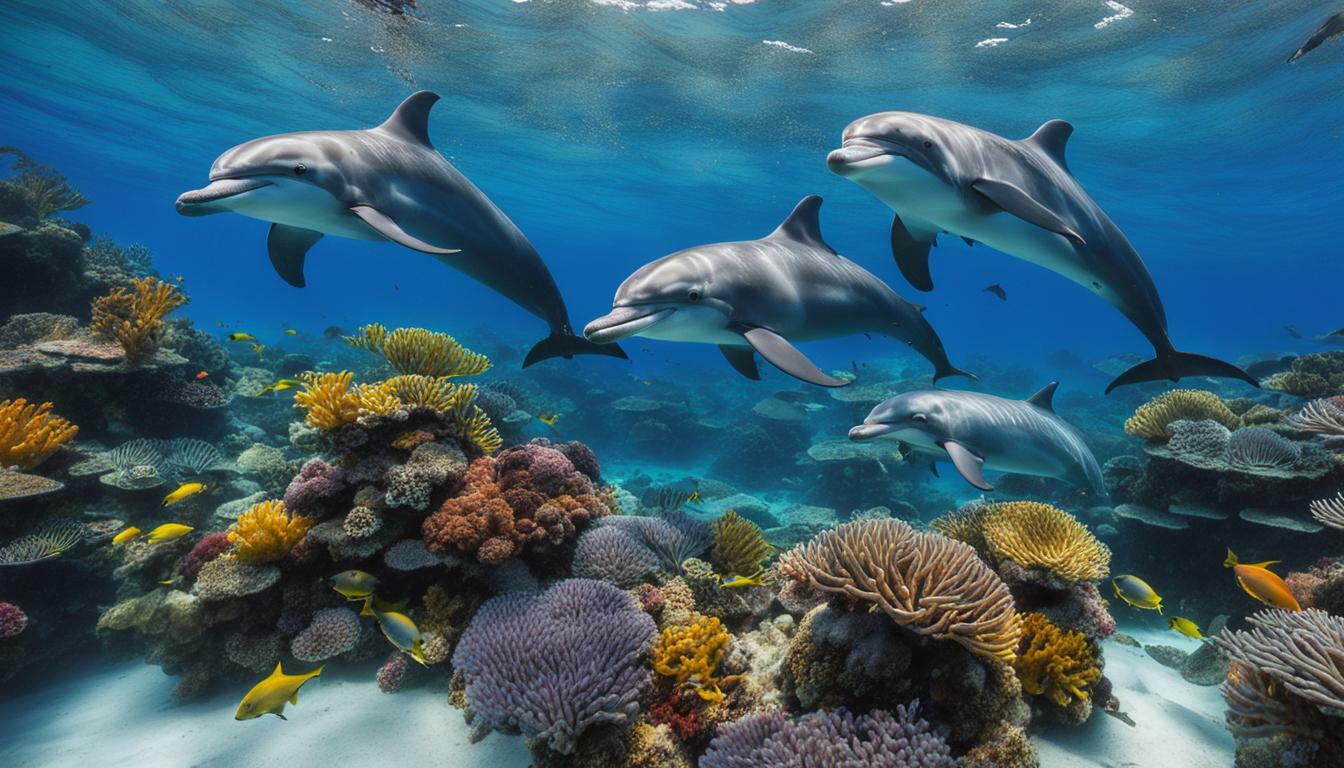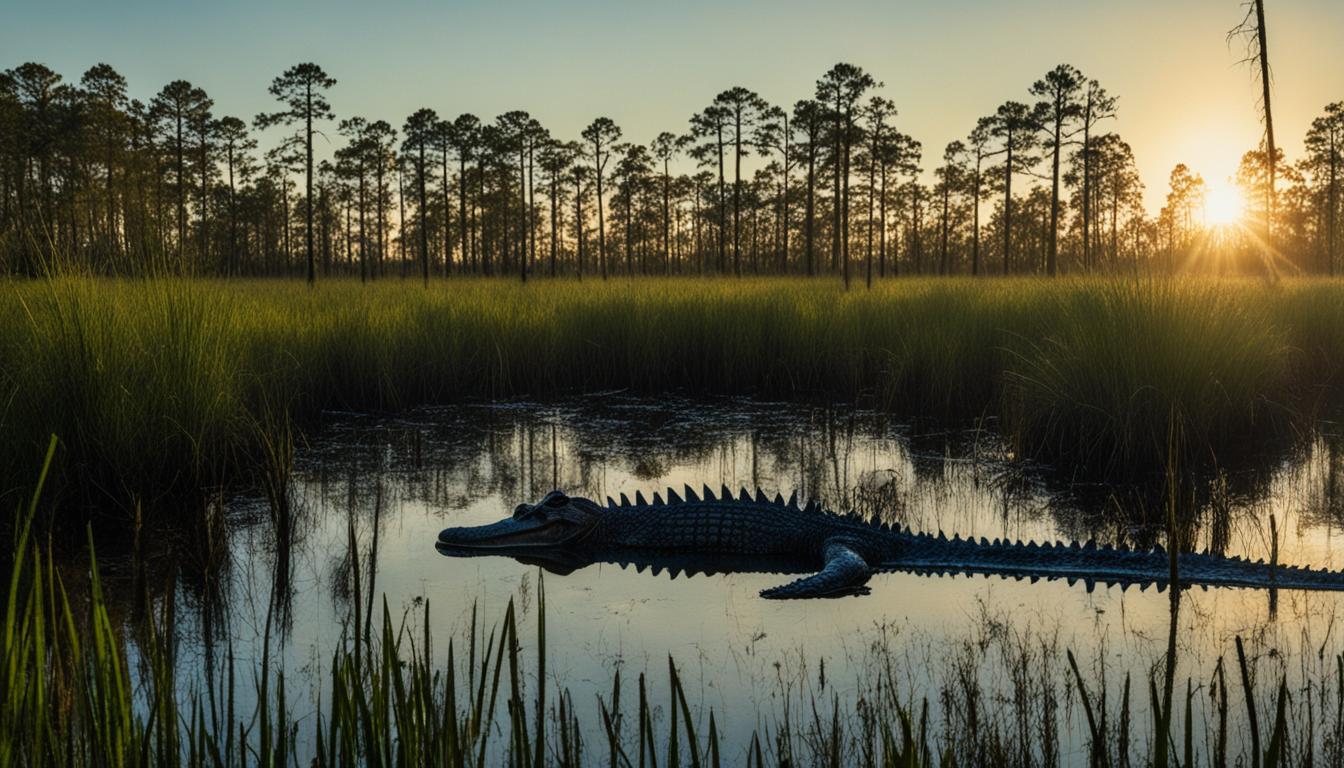Dolphins play a crucial role in maintaining the balance of marine ecosystems and are essential for the conservation of marine mammal species. These intelligent creatures are not only fascinating but also have a significant impact on the health and sustainability of our oceans.
As top-level predators in the ocean food chain, dolphins help to regulate the populations of fish and other marine organisms. Their presence ensures the ecological balance within the ecosystem, preventing any one species from dominating and maintaining the overall biodiversity.
Furthermore, dolphins act as indicators of environmental health. Their health and well-being can reflect the condition of their habitat. If dolphins are thriving, it is a positive sign that the ecosystem is functioning properly. However, if they are in decline or facing health issues, it can indicate underlying problems such as water pollution or changes in the food web.
Another vital role dolphins play is in disease control. They prey on ill or old fish, which helps to reduce the prevalence of infectious diseases among fish populations. By keeping disease in check, dolphins contribute to the overall health and stability of the marine ecosystem.
Scientists also rely on dolphins for marine study purposes. By studying their stomach contents and collecting tissue samples, researchers can gain valuable insights into their species, behavior, and the presence of pollutants in the marine environment. This information is crucial for understanding the impact of human activities on marine ecosystems and developing effective conservation strategies.
Lastly, dolphins have proven themselves to be guardians of the seas. With their exceptional intelligence and keen senses, they are capable of detecting and warning of illegal activities such as hunting or fishing practices that threaten the delicate balance of marine environments. Protecting dolphins is not only important for their conservation but also for preserving the overall health and sustainability of our oceans.
In conclusion, dolphins play a crucial role in ecosystems. Their presence helps maintain the balance, act as indicators of environmental health, assist with disease control, contribute to marine study, and serve as guardians of the seas. Protecting these remarkable creatures is essential for the conservation of marine mammal species and the long-term health of our marine environments.
The Keystone Species and Top Predators in Marine Ecosystems
Dolphins, as top predators and keystone species, play a vital role in shaping marine ecosystems by regulating prey populations and maintaining ecological balance. Their presence ensures the stability of the food chain and contributes to the overall health of the ocean. By preying on smaller fish and cephalopods, dolphins help control their populations, preventing them from becoming overly abundant and disrupting the delicate balance of the ecosystem.
As top predators, dolphins have a significant impact on marine biodiversity. Their consumption of smaller prey species helps to maintain species diversity and prevent any one species from dominating the ecosystem. This ensures a more stable and resilient ecosystem, capable of withstanding environmental changes and fluctuations.
“Dolphins are nature’s regulators, performing a crucial service in maintaining the ecological balance of the ocean,” says marine biologist Dr. Rebecca Morrison.
“Their role as top predators and keystone species cannot be overstated. They are essential in shaping the structure and function of marine ecosystems worldwide,”she adds.
| Role of Dolphins in Marine Ecosystems | Importance |
|---|---|
| Regulating prey populations | Ensures the balance of the food chain and prevents overpopulation |
| Maintaining ecological balance | Contributes to species diversity and overall stability of the ecosystem |
| Providing ecological services | Controls infectious diseases among fish populations and acts as indicators of ecosystem health |
Dolphins as Indicators of Ecosystem Health
Another crucial role dolphins play in marine ecosystems is acting as indicators of ecosystem health. Due to their high position in the food chain, dolphins accumulate pollutants that may be present in the water, making them valuable sentinels of environmental quality. Changes in their population size, distribution, or health can provide insights into the health of the entire ecosystem.
By studying dolphins, scientists can monitor the presence of pollutants and detect early warning signs of environmental degradation. These indicators help identify potential threats to other marine organisms and allow for timely intervention to protect the ecosystem. Thus, the conservation of dolphins not only benefits their species but also safeguards the overall health and sustainability of marine ecosystems.
- Dolphins act as indicators of ecosystem health
- Their position in the food chain makes them vulnerable to pollutants
- Monitoring dolphin populations can provide early warning signs of environmental degradation
The ecological significance of dolphins cannot be understated. Their role as top predators and keystone species ensures the proper functioning of marine ecosystems and the maintenance of ecological balance. By protecting these intelligent and remarkable creatures, we not only ensure their survival but also safeguard the health and vitality of our oceans for generations to come.
Dolphins as Indicators of Ecosystem Health
The well-being of dolphins is closely linked to the overall health of marine ecosystems, making them important indicators of ecosystem balance and the integrity of the marine food web. These intelligent creatures provide valuable insights into the state of their environment through their behavior, population numbers, and overall health.
One way dolphins serve as indicators of ecosystem health is through their position in the marine food web. As top-level predators, they help regulate the populations of smaller fish and maintain the balance of the entire ecosystem. Any changes in dolphin populations can signify shifts in the availability of prey species or disruptions in the food chain, which can have far-reaching effects on other marine organisms.
Dolphins also serve as living sentinels, warning us of potential threats and environmental issues. Due to their high sensitivity to pollutants, their health can indicate the presence of water pollution and other contaminants in the ecosystem. By monitoring the well-being of dolphins, scientists can gain valuable insights into the overall health of the marine environment and take necessary actions to address any potential threats.
Furthermore, dolphins play a crucial role in disease control within marine ecosystems. They prey on ill or old fish, helping to reduce the spread of infectious diseases among fish populations. By regulating fish populations, dolphins contribute to the overall health and stability of the ecosystem. Additionally, scientists can study dolphin stomach contents and collect tissue samples to gain a better understanding of their species and the presence of pollutants, providing further insights into the state of the marine environment.
Table 1: Examples of Dolphins as Indicators of Ecosystem Health
| Dolphin Behavior | Ecosystem Health |
|---|---|
| Dolphin strandings and mass mortality events | Potential environmental pollution or habitat degradation |
| Changes in dolphin population numbers | Shifts in prey availability or disruptions in the food chain |
| Dolphin health assessments | Presence of pollutants and overall water quality |
In conclusion, dolphins play a vital role as indicators of ecosystem health in marine environments. Their position as top-level predators, sensitivity to pollutants, and ability to regulate fish populations make them valuable sentinels for monitoring the overall health and integrity of our oceans. By protecting dolphins and their habitats, we can ensure the long-term sustainability and well-being of marine ecosystems.
Disease Control and Population Regulation
Dolphins contribute to disease control by preying on weakened fish, consequently reducing the spread of diseases among marine populations. With their exceptional hunting skills and intelligence, dolphins actively target ill or old fish, helping to maintain the overall health and balance of marine ecosystems.
According to a study conducted by marine biologists at the National Oceanic and Atmospheric Administration (NOAA), dolphins play a crucial role in keeping infectious diseases in check. By targeting vulnerable individuals in fish populations, dolphins effectively reduce the transmission of diseases, preventing outbreaks that could devastate marine life. This natural control mechanism helps to sustain the biodiversity and stability of the ocean food chain.
In addition to disease control, the study of dolphins provides valuable information about their species and the overall health of the oceans. By analyzing the stomach contents of dolphins, scientists can gain insights into their diet, feeding habits, and the presence of pollutants in the marine ecosystem. These findings are vital for understanding the impact of human activities on the oceans and devising effective conservation strategies.
“Dolphins are incredibly adaptive and resilient creatures. By studying their behavior and habitat, we can gain a better understanding of the complex marine ecosystems,” says Dr. Sarah Adams, a marine biologist at the University of California. “Their role in disease control and their ability to act as indicators of environmental health make them invaluable for ongoing research and conservation efforts.”
Table 1: Disease Control and Population Regulation
| Benefits of Dolphin Predation | Implications for Marine Ecosystems |
|---|---|
| Reduces spread of diseases among fish populations | Maintains balance and health of marine ecosystems |
| Controls population of weakened or ill fish | Prevents outbreaks that can decimate marine life |
| Contributes to overall biodiversity and stability of the ocean food chain | Sustains the health and resilience of marine populations |
Guardians of the Seas: Dolphins and Illegal Activities
Dolphins act as guardians of the seas, as they can detect illegal activities such as hunting or fishing, making their conservation efforts vital for the protection of marine ecosystems. These intelligent creatures have a remarkable ability to identify and alert humans to illegal practices, serving as a natural surveillance system in the ocean. Their presence is crucial in maintaining the balance and integrity of marine environments.
One of the key roles dolphins play as guardians of the seas is their detection of illegal hunting or fishing practices. Their acute senses, including their exceptional hearing and echolocation abilities, allow them to locate and track the activities of humans engaged in illegal actions. By alerting authorities to these activities, dolphins not only contribute to the preservation of marine life but also help combat illegal practices that can lead to the depletion of fish populations and damage ecosystems.
In addition to their detection capabilities, dolphins play a vital role in raising awareness and promoting conservation efforts. Their presence and behavior can serve as a reminder of the importance of protecting marine environments and the need for sustainable practices. By showcasing their intelligence and observing their interactions with their surroundings, humans gain a deeper understanding of the interconnectedness of marine ecosystems and the impact of their actions on these fragile habitats.
Ultimately, protecting dolphins is essential for the long-term health and sustainability of our oceans. Through conservation efforts, we can ensure these remarkable creatures continue to serve as guardians of the seas, helping to maintain the delicate balance of marine ecosystems and safeguarding the future of our planet.
| Dolphins as Guardians of the Seas | Importance |
|---|---|
| Detection of illegal hunting or fishing practices | Crucial in preserving marine life and combating illegal activities |
| Public awareness and conservation | Highlight the importance of protecting marine environments |
| Long-term health of marine ecosystems | Ensuring the sustainability of our oceans |
The Value of Dolphins for Marine Study
Dolphins serve as valuable subjects for marine study, allowing scientists to examine their stomach contents and collect tissue samples to gain a deeper understanding of their species and monitor the impact of pollutants on the marine environment.
By analyzing the stomach contents of dolphins, researchers can obtain valuable information about their diet and feeding habits. The examination of prey items provides insights into the marine food web and helps assess the overall health of the ecosystem. Additionally, the presence of pollutants in the stomach contents can indicate the extent of contamination in the marine environment, highlighting the need for conservation efforts and stricter regulations to preserve the delicate balance of our oceans.
Another vital aspect of studying dolphins is the collection of tissue samples. Through biopsies, researchers can analyze the genetic makeup of dolphins, gaining a better understanding of their species and population structure. These samples also allow for the detection of pollutants, such as heavy metals or harmful chemicals, which can have detrimental effects on marine life. The analysis of tissue samples helps scientists monitor the long-term impacts of pollution and aids in the development of strategies for mitigating its effects.
| Benefits of Dolphin Study | |
|---|---|
| 1. Insights into the marine food web | Scientists can examine dolphin stomach contents to understand the diet and feeding habits of these marine mammals, providing valuable information about the health and balance of the marine food web. |
| 2. Detection of pollutants | Tissue samples collected from dolphins can be analyzed to assess the presence of pollutants, allowing scientists to monitor the impact of contamination on the marine environment and develop effective conservation strategies. |
| 3. Understanding species and population structure | By studying the genetic makeup of dolphins, researchers gain insights into their species and population structure, contributing to the conservation and management of these intelligent creatures. |
The importance of dolphin study extends beyond the immediate benefits to these fascinating marine mammals. By understanding their ecological role and the impact of pollutants on their health, we can take necessary actions to protect not only dolphins but also the entire marine ecosystem. Conservation efforts and continued research are crucial to maintaining the health and sustainability of our oceans for future generations.
The Role of Dolphin Conservation in Maintaining Ecosystem Health
Protecting dolphins is crucial for maintaining a healthy ocean ecosystem, as their well-being directly impacts the overall balance and functioning of marine ecosystems. Dolphins play a vital role as indicators of environmental health, helping us understand the state of our oceans and the impact of human activities. By monitoring the health of dolphin populations, scientists can gain valuable insights into the health of the marine environment and the presence of pollutants.
In addition to serving as environmental indicators, dolphins also play a significant role in disease control. As top-level predators in the ocean food chain, dolphins prey on ill or old fish, effectively reducing the spread of infectious diseases among fish populations. This natural mechanism helps maintain the ecological balance within the marine ecosystem, ensuring the overall health of fish populations and promoting marine biodiversity.
Furthermore, dolphins are valuable subjects of study for scientists and researchers. By studying their stomach contents and collecting tissue samples, researchers can gain a deeper understanding of dolphin species, behavior, and the presence of pollutants in the marine ecosystem. This information is crucial for developing effective conservation strategies and safeguarding the long-term health of our oceans.
Lastly, dolphins serve as guardians of the seas, acting as sentinels for illegal activities such as hunting or fishing. Their keen senses and intelligence allow them to detect and alert us to these activities, aiding in the protection of marine resources and the enforcement of conservation laws. By conserving dolphins and their habitats, we are not only preserving these magnificent creatures but also safeguarding the delicate balance and functioning of marine ecosystems for future generations.
Summary:
- Dolphins are crucial indicators of environmental health, helping us understand the state of our oceans
- They play a vital role in disease control by preying on ill or old fish and reducing the spread of infectious diseases
- Scientists study dolphins to gain insights into species, behavior, and the presence of pollutants in the marine ecosystem
- They act as guardians of the seas, detecting and alerting us to illegal activities like hunting or fishing
- Conserving dolphins and their habitats is essential for maintaining a healthy ocean ecosystem
| Dolphin Conservation Efforts | Benefits to Marine Ecosystems |
|---|---|
| Monitoring dolphin populations | Indicate overall environmental health and presence of pollutants |
| Top-level predator role | Help control diseases by preying on ill or old fish |
| Scientific research on dolphins | Gain insights into species, behavior, and presence of pollutants |
| Dolphin surveillance | Detect and alert illegal hunting or fishing activities |
| Conservation measures | Safeguard the overall balance and functioning of marine ecosystems |
How Does the Feeding Habits and Prey Selection of Dolphins Contribute to their Role in Ecosystems?
Dolphins’ feeding habits and prey selection play a vital role in maintaining ecosystem balance. As opportunistic predators, dolphins exhibit a diverse diet, feeding on fish, squid, and crustaceans. By consuming different prey species, they help control population sizes, preventing overgrazing and maintaining the overall health of the food chain. Moreover, their ability to detect and target specific prey enhances their efficiency as ecological indicators, indicating changes or imbalances within their habitat.
Conclusion
Dolphins play a vital role in ecosystems as indicators of environmental health, disease control agents, and guardians against illegal activities. Protecting and conserving these intelligent creatures is essential for maintaining the balance and integrity of our marine ecosystems.
As top-level predators in the ocean food chain, dolphins help regulate the populations of fish and other marine species. Their presence helps keep diseases in check by preying on ill or old fish, reducing the spread of infectious diseases among fish populations. This important role in disease control contributes to the overall health of marine ecosystems.
Furthermore, dolphins are valuable subjects for marine study. Scientists can study their stomach contents and collect tissue samples to gain insights into their species, behavior, and the presence of pollutants in the marine environment. By understanding the effects of pollution on dolphins, we can better comprehend the impact on other marine organisms and the overall health of the ecosystem.
Additionally, dolphins have proven to be effective guardians against illegal activities in marine environments. Through their remarkable intelligence and sensory abilities, they can detect illegal hunting or fishing practices, helping to curb these activities and protect the delicate balance of marine ecosystems. Their presence serves as a reminder that the conservation efforts towards dolphins are not only about preserving a single species but also safeguarding the health and integrity of the entire ecosystem.
In conclusion, recognizing the crucial role that dolphins play in ecosystems is essential for the long-term sustainability of our oceans. By safeguarding their habitats, reducing pollution, and enforcing conservation efforts, we can ensure a healthy and thriving marine environment for generations to come.











